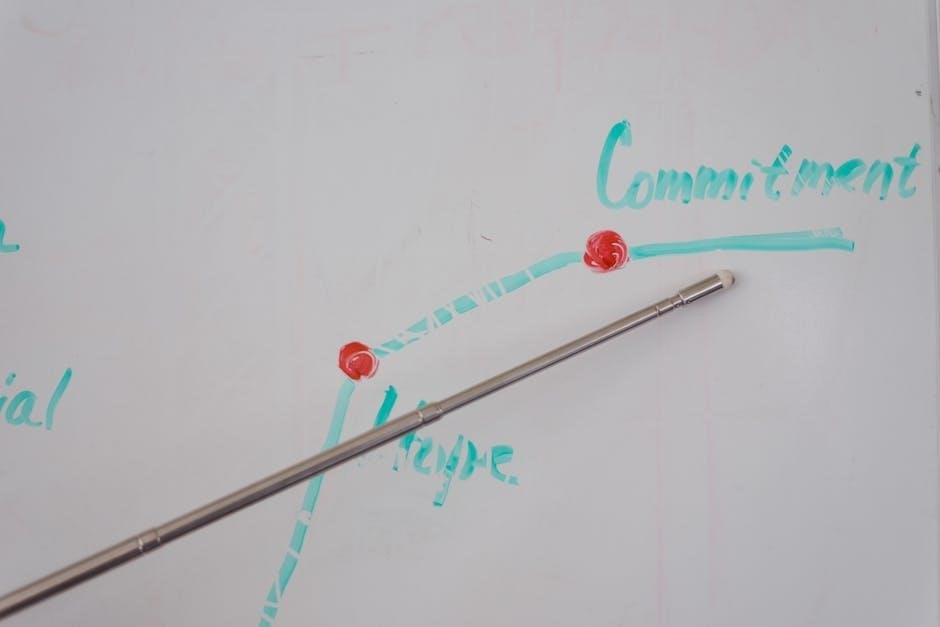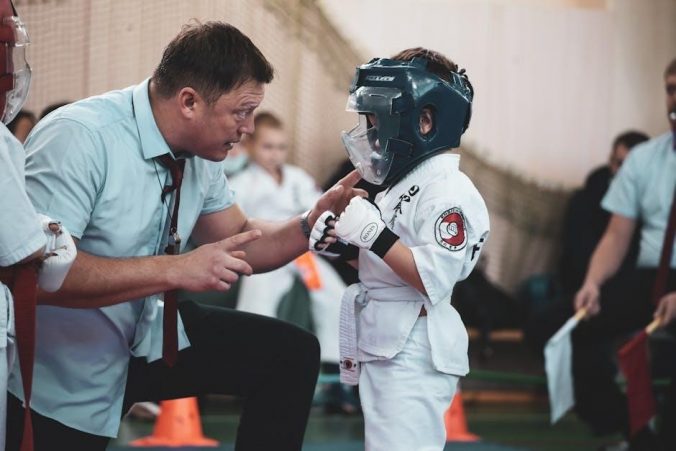The JROTC Leadership Education and Training Program is a high school program focused on developing leadership, citizenship, and character in students through structured curriculum and activities․
1․1 Overview of the JROTC Program and Its Objectives
The JROTC Leadership Education and Training Program is a four-year curriculum designed for high school students, focusing on leadership development, citizenship, and personal growth․ The program is structured to equip cadets with essential life skills, including teamwork, communication, and problem-solving․ Its primary objective is to inspire and prepare students to become responsible citizens and leaders in their communities․ Through a blend of academic instruction and practical activities, JROTC fosters discipline, respect, and self-confidence․ The program also emphasizes community service, encouraging cadets to actively contribute to society․ By integrating leadership theory with real-world applications, JROTC aims to create a foundation for future success in both military and civilian life․
1․2 The Importance of Leadership Development in JROTC
Leadership development is the cornerstone of the JROTC program, empowering students to become confident, ethical, and effective leaders․ Through structured courses and hands-on experiences, cadets learn to navigate challenges, make informed decisions, and inspire others․ These skills are not only vital for military careers but also for success in college, careers, and community roles․ By fostering resilience, accountability, and teamwork, JROTC prepares students to lead with integrity and compassion․ The program’s emphasis on leadership ensures that graduates are equipped to positively impact their communities and thrive in an ever-changing world․ This foundation of leadership is a lifelong asset, benefiting cadets far beyond their high school years․

Structure of the JROTC Leadership Education and Training (LET) Program
The JROTC LET Program is a four-year curriculum designed to progressively develop leadership skills, starting with foundational concepts and advancing to complex leadership challenges and responsibilities․

LET1 is the first course in the JROTC Leadership Education and Training Program, designed to introduce students to the fundamentals of JROTC and basic leadership principles․ This course focuses on the JROTC mission, core values, and the importance of citizenship and service․ Cadets learn essential leadership skills, such as communication, teamwork, and problem-solving, through interactive lessons and practical exercises․ LET1 also covers the history and structure of JROTC, providing a foundation for future courses․ By engaging in team-building activities and leadership challenges, cadets begin to develop the confidence and skills necessary to succeed in the program and beyond․ This course sets the stage for advanced leadership development in subsequent LET levels․
2․2 LET2: Leadership Theory and Application
LET2 builds on the foundational knowledge from LET1, diving deeper into leadership theory and its practical application․ This course explores advanced leadership concepts, including decision-making, communication strategies, and team dynamics․ Cadets analyze leadership styles and learn to apply theoretical frameworks to real-world scenarios․ Practical exercises and case studies help develop critical thinking and problem-solving skills․ LET2 emphasizes the importance of ethical leadership and cultural awareness, preparing cadets to lead diverse groups effectively․ Through interactive activities and group projects, students refine their ability to inspire and guide others, fostering a strong sense of responsibility and accountability․ This course equips cadets with the tools to apply leadership principles in various contexts, both within and outside JROTC․
2․3 LET3: Advanced Leadership and Team Building
LET3 focuses on refining advanced leadership skills and fostering effective team building․ Cadets learn sophisticated strategies for leading diverse groups, emphasizing collaboration, adaptability, and conflict resolution․ This course introduces complex scenarios that require strategic planning and decisive action․ Through immersive exercises, cadets develop the ability to inspire and motivate others while maintaining cohesion within teams․ Practical challenges, such as problem-solving activities, enhance their capacity to work collectively toward common goals․ LET3 also explores the importance of emotional intelligence and empathy in leadership, preparing cadets to navigate dynamic environments․ By mastering these skills, cadets become capable of leading high-performing teams and achieving success in various contexts․
2․4 LET4: The Managing Leader and Final Preparation
LET4 is the final course in the JROTC Leadership Education and Training Program, focusing on advanced leadership strategies and practical application․ Cadets transition from followers to leaders, mastering decision-making, delegation, and organizational management․ This course emphasizes ethical leadership, problem-solving, and communication skills․ Cadets engage in simulations and real-world scenarios to refine their abilities․ LET4 also prepares students for future challenges, whether in military or civilian roles, by reinforcing leadership principles and teamwork․ The course culminates in a comprehensive assessment of leadership skills, ensuring cadets are ready to apply their knowledge effectively in various contexts․ It is the capstone experience for JROTC leadership development․
Key Components of the JROTC Program of Instruction

The program includes curriculum design, practical activities, and community service, fostering leadership, teamwork, and citizenship through structured learning and hands-on experiences for cadets․
3․1 Curriculum Design and Core Courses
The JROTC curriculum is designed to provide a comprehensive education in leadership, citizenship, and character development․ Core courses include Leadership Education and Training (LET) 1-4, which progressively build skills from basic leadership fundamentals to advanced management techniques․ LET1 introduces cadets to JROTC and foundational leadership principles, while LET2 focuses on leadership theory and practical applications․ LET3 emphasizes team building and advanced leadership, and LET4 prepares cadets for managerial roles and future challenges․ The curriculum also includes elective courses that allow cadets to explore specialized topics such as public speaking, writing, and financial literacy, ensuring a well-rounded educational experience․
3․2 Role of Practical Activities and Exercises
Practical activities and exercises play a crucial role in the JROTC program, complementing classroom instruction by providing hands-on learning experiences․ These activities, such as team leadership problems and challenges, are designed to teach teamwork, communication, and problem-solving skills․ Cadets participate in exercises that simulate real-world scenarios, fostering critical thinking and adaptability․ For example, activities like navigating obstacles or planning strategies to achieve group goals help cadets apply leadership principles learned in the classroom․ These exercises also promote camaraderie and mutual support, preparing cadets to work collaboratively in diverse situations․ By engaging in these practical experiences, cadets develop the confidence and skills necessary for effective leadership and teamwork․
3․3 Importance of Community Service and Citizenship
Community service and citizenship are cornerstone values of the JROTC program, emphasizing the importance of giving back to society and fostering responsible civic engagement․ Cadets participate in various service activities, such as volunteering, parades, and community events, which cultivate a sense of social responsibility․ These experiences help students understand their role as active citizens and leaders in their communities․ By engaging in service, cadets develop empathy, teamwork, and a commitment to improving society․ JROTC also teaches the significance of honoring national heritage through ceremonies and traditions, reinforcing patriotism and respect for the nation․ This focus on citizenship and service prepares cadets to contribute positively to their communities and society at large․

Outcomes and Benefits of the JROTC Leadership Program
The JROTC program fosters leadership skills, personal growth, and civic responsibility, preparing students for future success through enhanced critical thinking, teamwork, and communication abilities․

4․1 Development of Critical Thinking and Problem-Solving Skills
The JROTC program emphasizes critical thinking and problem-solving, encouraging cadets to analyze situations, evaluate options, and make informed decisions․ Through practical exercises and real-world challenges, students enhance their ability to approach complex scenarios methodically․ These skills are cultivated through team leadership problems, where cadets work collaboratively to devise solutions․ The curriculum also includes lessons on effective communication and adaptability, essential for resolving conflicts and overcoming obstacles․ By fostering a mindset of resourcefulness and creativity, JROTC prepares students to tackle challenges not only in their academic careers but also in their future endeavors․
4․2 Building Confidence and Personal Responsibility
The JROTC program plays a pivotal role in fostering confidence and personal responsibility among cadets․ Through structured activities, public speaking exercises, and leadership opportunities, students gain self-assurance in their abilities․ Cadets are encouraged to take ownership of their actions, fostering accountability and integrity․ The program emphasizes the importance of setting goals, adhering to deadlines, and maintaining high standards of conduct․ By participating in team-building exercises and community service, cadets develop a sense of duty and responsibility, essential for personal growth and future success․ These experiences help shape individuals who are self-disciplined, resilient, and prepared to contribute positively to their communities․

4․3 Preparing Students for Future Success

The JROTC program equips students with essential skills to excel in future academic and professional endeavors․ By fostering critical thinking, problem-solving, and communication abilities, cadets gain a competitive edge․ The curriculum emphasizes practical application of leadership principles, enabling students to navigate challenges effectively․ Mentorship opportunities and real-world exercises further enhance their readiness for post-secondary pursuits․ Whether pursuing higher education or entering the workforce, JROTC graduates are well-prepared to succeed․ The program instills a strong work ethic, resilience, and a commitment to lifelong learning, ensuring cadets are empowered to achieve their goals and make meaningful contributions in their chosen paths․

Leave a Reply
You must be logged in to post a comment.